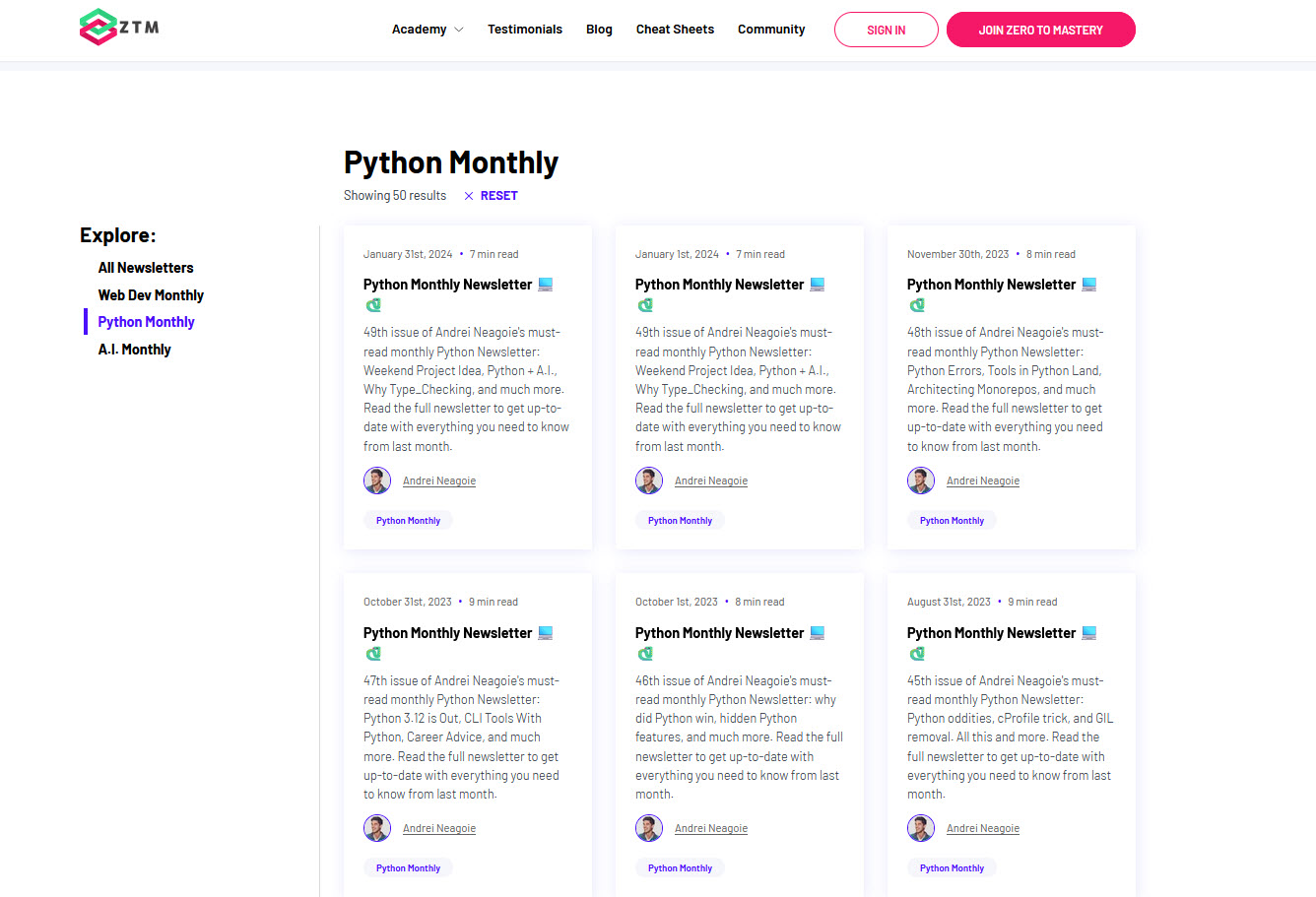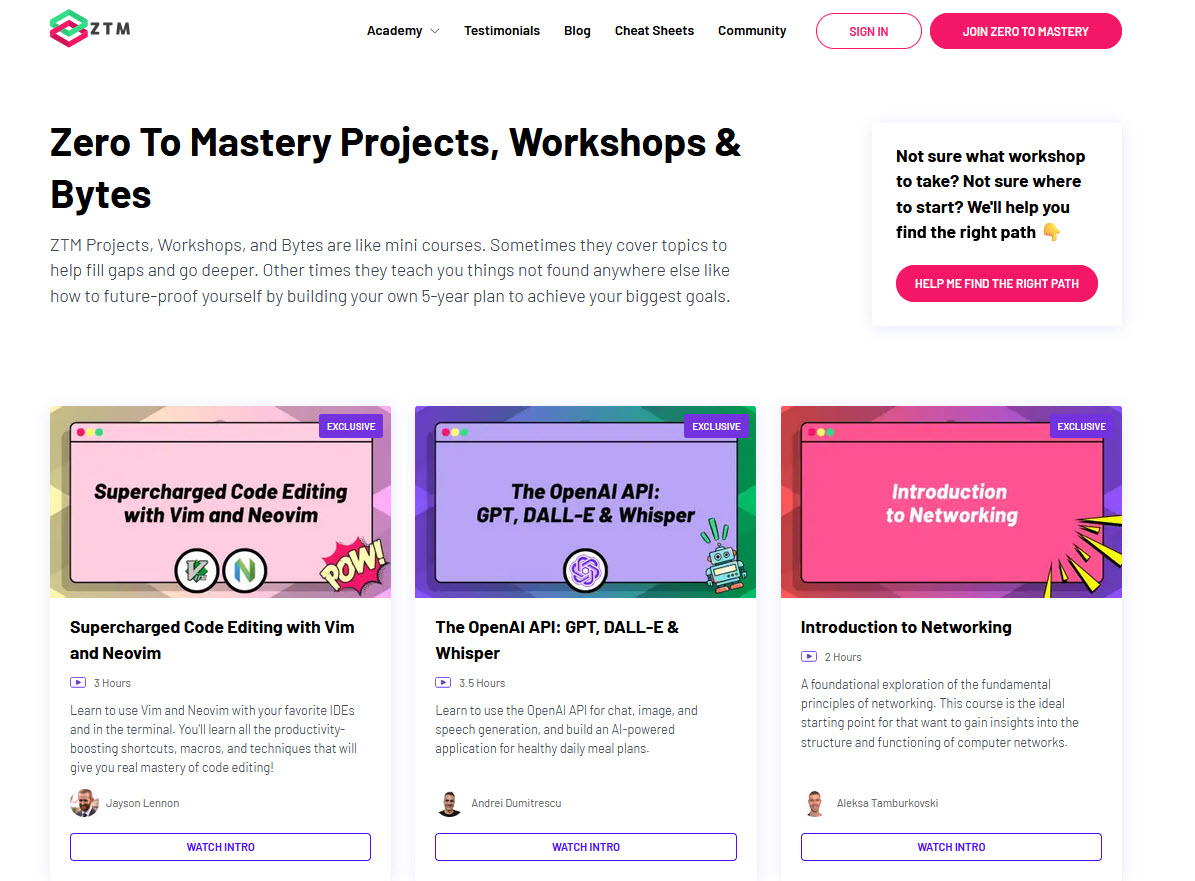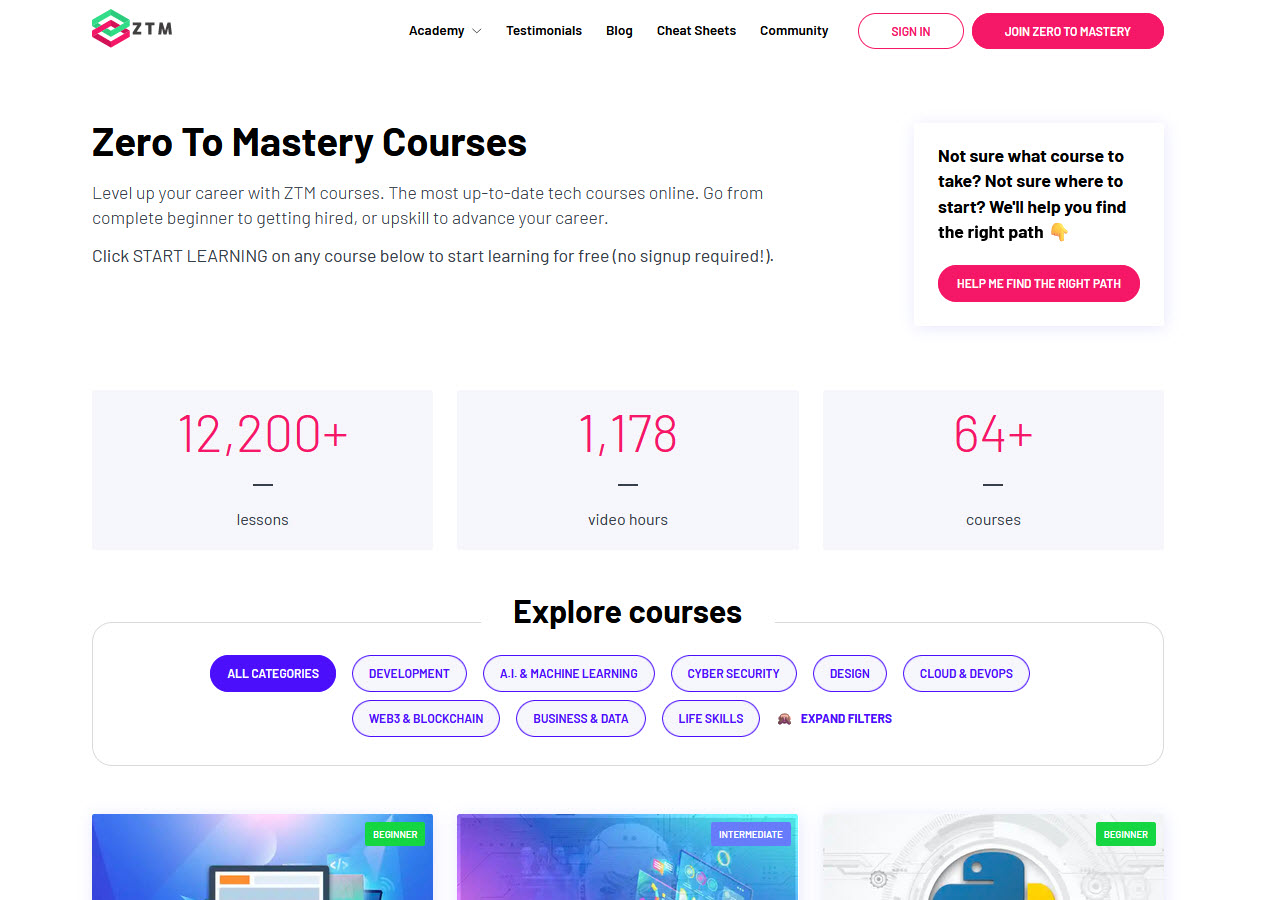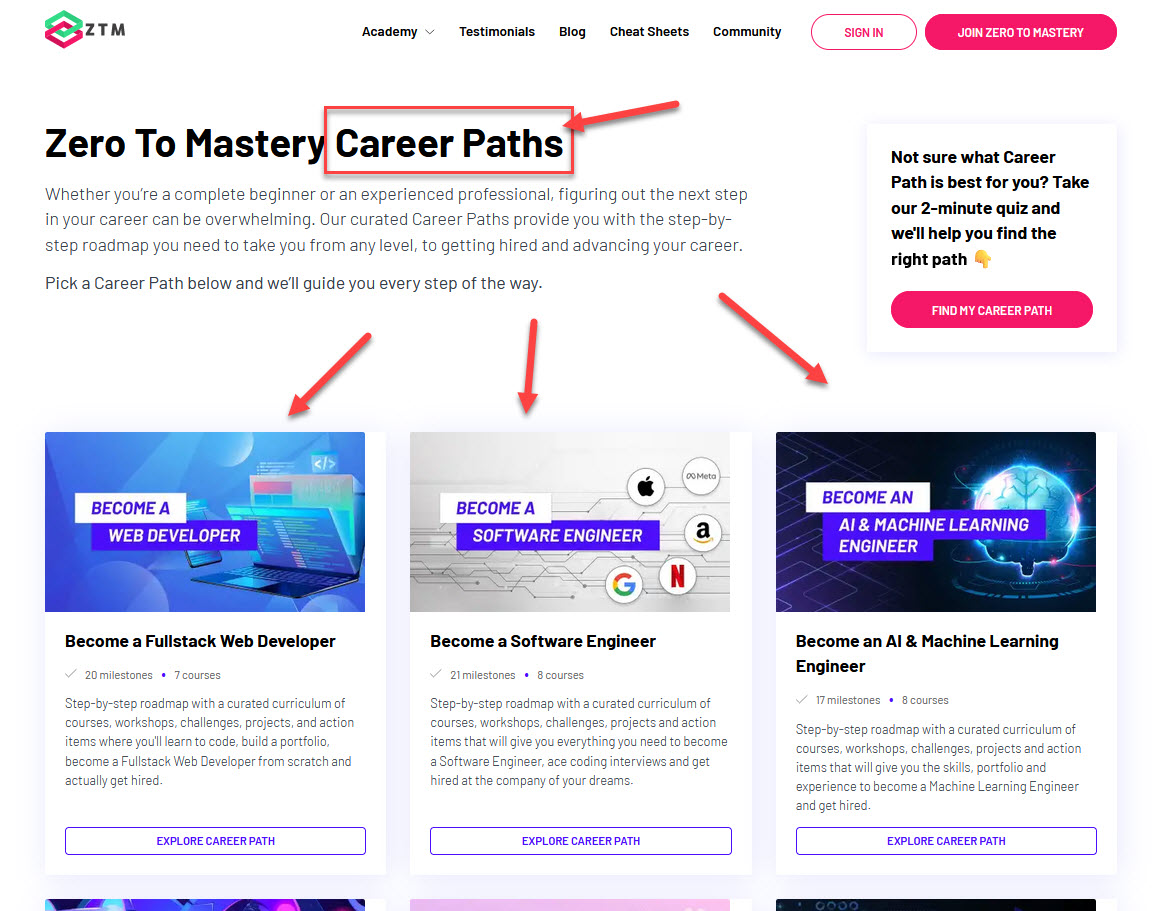The tech industry moves at a rapid pace, with new technology and trends emerging all the time.
This ever changing environment is a large part of what makes it such an exciting field, but it also means that if you’re new to tech, it can be hard to keep up, and if you’re not careful, you can fall behind.
A lot of people don’t mind this, and that’s totally fine. There are a lot of tech companies out there that run on older languages and frameworks and only make minor code updates, and the pay is pretty good.
However, if you do keep your tech skills up to date then you not only make yourself far more valuable to employers and make yourself recession-resilient, but the sky's the limit in terms of job offers, promotions, and salary increases.
The trick of course, is knowing how to do this efficiently which is what I'm going to show you how to do in this guide.
Even better? I’m going to give you 4 simple tips that you can follow to not only stay on track, but get ahead of the curve (and your peers 😉).
So let’s dive in…
Tip 1. Stay up to date with news and updates related to tools you use
Super simple and probably the most obvious step, but make sure you stay in the loop on the latest news and updates regarding the tools that you currently use.
This way you’ll know of any issues and changes, as well as any upcoming updates.
Almost every programming language, framework, or industry tool has a blog of their own, but you can also usually find some accompanying news sites and roundups that help you stay on track.
For example
If you use Python for work, then you can:
- Subscribe to the official Python Blog and maybe one other Python related blog that publishes frequently like Real Python
- Get curated updates via a few different Python newsletters out there
- If you're a commuter, you could also seek out relevant Python related podcasts to listen to
- You could also find reputable people in your industry to follow on Twitter/X and create your own list
You can follow these steps really for any skill set.
Tip 2. Stay on top of broader industry information
Make sure you also stay up to date with industry specific news.
For example
If you're a Web Developer (regardless of the programming language you use most often), make sure you’re staying on top of the latest Web Development industry news.
If you're a Machine Learning Engineer or are looking to get a career in AI, then find a good Machine Learning / AI newsletter.
This is super important, because if you know what's happening across your industry as a whole, you can start to identify trends in tools, industry focus points or direction changes, and even identify skill gaps that you can fill.
For example
You might see that a certain element of your industry is experiencing huge growth but is under served.

Cloud Engineering is set to become a $1.5 Trillion dollar industry, with high demand, great salary, and a shortage of people.
Sure, you might not know much about Cloud right now, but it definitely gives you something to work on and learn. (More on this later).
For now, be sure to follow latest industry specific news:
- Subscribe to curated newsletters and specific industry blogs
- Follow YouTube channels and Podcasts
Obviously tailor this to your profession so that you’re getting broader industry information around your field of interest.
For example
If you’re a UI/UX Designer that uses Figma a lot, then:
- Subscribe to 1-2 design newsletters
- Subscribe to 1-2 design related youtube channels + maybe a podcast (good to listen to while you're out for a walk getting some fresh air or commuting)
- Subscribe to Figma's blog
- Follow a few relevant people on Twitter/X
Then take it a step further and follow even broader content, so you get a wider overview of tech. It’s not vital but always good to see what’s happening elsewhere and how it might affect you.
For example
You could easily argue the point that the growth in Cloud adoption has led to a surge in cloud data servers and computational power, allowing AI to actually grow.
It all has ripple effects, so stay on top of it!
I recommend:
- Getting curated news using plugins like DailyDev
- Follow broader blogs and forums such as DevTo, HashNode, HackerNoon, HackerNews, and others
The benefit of these things is that they will surface the most popular posts and topics for you, so you can just check out the top ones each week.
A word of caution here:
Just don't over do it and spend too much time here on these first two steps.
You can easily get sucked in to reading so much news but never actually doing anything with it. You really only need to spend 30-60 minutes a week.
I recommend that you spend a bit more time upfront finding a few good sources that curate the most important news and updates for you, so you can save time.
(Not to mention that checking 10 different places for updates every week and feeling overwhelmed!)
Tip 3. Continue to improve your current skills and add new ones
So far we’ve just been gathering information only. And sure, knowledge is great but we need to apply it if we want to improve right?
This is the place you should spend the most time.

Now, some people will simply tell you to code (or design or build ML models- whatever your niche is) every day. The idea behind this is that the more you do it, the better you'll get. The end.
Consistency is great but let’s be honest - if you’re already using whatever skill it is you use in your job full-time, then this advice is a bit useless.
- You're likely doing very similar things most of the time so you're mostly just maintaining your existing knowledge
- You're definitely going to be improving with every project you work on, and problems you solve at work are a great learning experience. But the problem is that everyone else is also doing this so you're just meeting the bare minimum. If you're reading this post, you're the type of person that wants to level-up!
So how should you do that?
Double down on your current skills
The best way to do this is to build your own side project or work on an open-source project!
There are plenty of benefits to doing this outside of just giving you a new way to sharpen your existing skills:
- You'll likely meet new people through this project
- It's something you can add to your portfolio and make you more recession proof
- Maybe you'll even be able to earn a little side income
Add new related skills
Maybe you're a front-end developer but don't have much experience with back-end. Or you think it would be cool to add 3D experiences directly within a web browser.
Or you're a product designer but haven't spent much time learning illustration or motion design or new AI tools like midjourney.
Adding these new skills to your toolkit could be very valuable but you might not have opportunities to do so as part of your day job, and that's where working on those personal or open-source projects that interest you come in.
Also, if you've followed Tip #1 and #2, then you're already doing a good job staying on top of the industry news in your field and the broader tech industry. This means you'll be able to quickly identify and choose topics/skills that are trending that might become more important in your industry, that you can then work on.
The most obvious example these days is the introduction of various AI tools that are specifically built for all kinds of different industries.
Heck... we recommend you start playing around with AI with your work, regardless of your field. The results can be incredible, and again, it makes you recession proof!
Double down on the fundamentals
This one might be a bit more specific to the folks in engineering related roles but it's always a good idea to double down on foundational content like system design or data structures & algorithms.
While you won't necessarily use them directly on a day-to-day basis, they'll give you a better toolkit for solving problems and making better decisions.
Many people don't do these but learning these skills are some of the "technical skills" that you'll need to get promoted into senior roles. Hint hint.
Learn skills you need to get that promotion
Speaking of which...
If you're looking to advance your career and get promoted, there are usually a clear set of technical skills as well as criteria that companies look for.
So figure out what skills you need to learn to land a more Senior role for your profession and prioritize filling in the gaps that you're missing.
You could even set a goal like: I want to get promoted to Senior Developer within the next year.
Then I highly recommend talking to your boss. Let them know about your goal and ask them what it would take to get there.
- What specific skills do you need to work on?
- Where do you need to improve?
- What are the characteristics of the people getting promoted?
Then prioritize working on these items and asking your boss for opportunities to prove yourself. They'll appreciate your initiative.
Seek opportunities to work on your soft skills
Soft skills are often overlooked in tech (or any industry to be fair), but they are incredibly valuable.
We cover it more in this guide here, but here's the bottom line.
By improving your soft skills, you can:
- Communicate more effectively
- Better handle stress
- Function more efficiently, and
- Increase you're likelihood of a promotion. (Thanks to these combined factors).
They even bleed over into your day-to-day life, they are that valuable!
I highly recommend you put some work on improving your soft skills. Read the guide above for tips, as well as watch the video below.
Skill stacking
This is another super underrated tip, but don’t just stick to improving your skills in your current field! Take it a step further and add skills that might be totally outside of your main focus.
For example:
- You're a developer... learn cyber security
- You're a designer... learn to code
- You're a devops engineer... learn machine learning
- You're any of these roles... learn marketing or SEO
Why do this?
Again, by skill stacking, you're adding value and improving your options for new careers. However, it's more than that.
When you skill stack, you start to open up areas of expertise with overlap that you might not immediately notice, that compound upon each other and open up new areas of thinking.
You'll be definitely surprised by how much this will affect the trajectory of your career.
Sounds great right? But how should you learn these?
This really depends on the skill we're talking about and your learning style. I provided some resources above but the other two main places I'd recommend are:
-
You can find YouTube tutorials on a ton of topics but the quality can be hit and miss (so make sure to do your own research)
-
If you're already working full-time, your time is limited so invest in yourself and learn more efficiently by finding a relevant course on the topic that you want to learn. (Just make sure it's up-to-date)
Or if there's a new industry trend that you're excited about and maybe want to go all-in on switching roles completely, then go find a clear roadmap of what to learn to make it happen and then dedicate your time to learning what you need to make the switch.
A good roadmap will show you what to learn in what order. (Maybe jump on that AI Engineering hype or go for the sure thing and become a Cloud Engineer).
You might even be able to skip some steps based on your current skills, so the path to that new career might be shorter than you think.
TL;DR
The key is to always be improving and learning, but be a bit strategic about it and efficient with your limited time.
If your goal is to earn more money, then don’t focus on learning an old programming language that's slowly dying off (ex: PHP). Learn something that is growing quickly and in high-demand (ex: cybersecurity).
Not sure what to learn? Check out the most in-demand tech careers in 2024 to see if there's something that catches your eye.
If your goal is to just learn for fun (which is great too by the way), then do something completely different. You never know how it might come in handy or apply to your current role in a way you would have never imagined.
Tip 4. Collaborate and communicate
This final tip will help you to stick to your goals, widen your chances of seeing new trends, and improve chances of promotions or new jobs and career opportunities.
- Join an online community in your industry
- Get an accountability partner
- Contribute to open source projects
- Visit tech conferences, events, and workshops
Communities, GitHub contributions, and conferences help you to stay on top of new information and network for new career opportunities.
As an added bonus, a good community will usually have the option of setting up an accountability partner also, to help you follow through on what ever new skill you’re learning.

Accountability partners have a HUGE impact on your chances of following through and finishing what you started, so I highly recommend this.
Worst case scenario, you can always post a thread in whatever community you join and then try to find a partner there.
Now it’s your turn. Take action now and improve your skills!
So there you have it - 4 super simple tips to help keep your tech skills up to date and even ahead of the curve.
Although they seem easy, don’t procrastinate. They really can have a huge impact on your work and the growth of your career.
Even spending a little bit of time each day (ie: 30 minutes) for self-improvement and evolving your skills can pay off big time and make you more resilient.
For example
If you're in the unfortunate position of being laid off from a role, you’ll already have a more diverse skill set to get hired asap elsewhere.
However, if you're the type of person following the steps above, you're also less likely to be one of the people who gets let go in the first place.
Like I said, the first 2 tips should only take 30-60 minutes a week and only a few minutes to set up, so go get them done now.
Then, spend a little time each day working on a personal side project or maybe find a course to quickly learn a new skill. Just never stop learning.
It’s one the main benefits of a tech career (after the salary), so embrace it!





![Learning to Learn [Efficient Learning]](https://images.ctfassets.net/aq13lwl6616q/6VWcUgLgG0SU55ORlILe2S/e186361aeb48561bcd19ae6486577022/Learning_to_Learn.jpg?w=600&h=336&fl=progressive&q=50&fm=jpg&bg=transparent)






